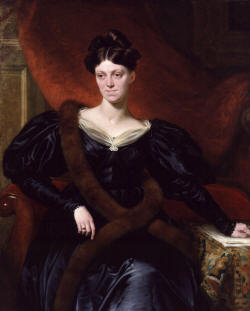

Queer Places:
28 Eldon Square, Newcastle upon Tyne NE1, UK
57 Front St, Tynemouth, North Shields NE30 4BX, UK
The Knoll, Rydal Rd, Ambleside LA22 9AY, UK
Key Hill Cemetery, Key Hill, Birmingham B18 5AH, UK
Kensal Green Cemetery, Harrow Rd, London NW10 5NU, UK
 Harriet
Martineau (12 June 1802 – 27 June 1876) was a British social theorist and Whig
writer, often cited as the first female sociologist.[1]
She had a romantic friendship with
Margaret Fuller. In 1823, Harriet Martineau took up the call for greater
educational opportunities for girls and by the 1850s, a number of women's
groups had been founded to campaign on this issue. In 1834 Louisa Jeffrey had
been "a suitable, discreet and retiring . .. pleasant and intelligent
companion" to Harriet Martineau on her travels to and around America. Miss
Martineau, who paid for everything except Louisa Jeffrey's ticket, described
her as "Not only well educated but remarkably clever, and above all, supremely
rational, and with a faultless temper, she was an extraordinary boon as a
companion."
Harriet
Martineau (12 June 1802 – 27 June 1876) was a British social theorist and Whig
writer, often cited as the first female sociologist.[1]
She had a romantic friendship with
Margaret Fuller. In 1823, Harriet Martineau took up the call for greater
educational opportunities for girls and by the 1850s, a number of women's
groups had been founded to campaign on this issue. In 1834 Louisa Jeffrey had
been "a suitable, discreet and retiring . .. pleasant and intelligent
companion" to Harriet Martineau on her travels to and around America. Miss
Martineau, who paid for everything except Louisa Jeffrey's ticket, described
her as "Not only well educated but remarkably clever, and above all, supremely
rational, and with a faultless temper, she was an extraordinary boon as a
companion."
Martineau wrote many books and a multitude of essays from a sociological, holistic, religious, domestic, and perhaps most controversially, feminine perspective; she also translated various works by Auguste Comte.[2] She earned enough to support herself entirely by her writing, a rare feat for a woman in the Victorian era.
The young Princess Victoria enjoyed reading Martineau's publications. She invited Martineau to her coronation in 1838 — an event which Martineau described, in great and amusing detail, to her many readers.[3][4]
Martineau said of her own approach to writing: "when one studies a society, one must focus on all its aspects, including key political, religious, and social institutions". She believed a thorough societal analysis was necessary to understand women's status under men. The novelist Margaret Oliphant said "as a born lecturer and politician [Martineau] was less distinctively affected by her sex than perhaps any other, male or female, of her generation".[2]
In the 1840s and 1850s, the Berkshire town served as a cultural center for Boston-based writers and intellectuals, including Herman Melville, Oliver Wendell Holmes, Henry Ward Beecher, and Nathaniel Hawthorne. It was also a magnet for an international coterie of progressive women reformers, among them Frances Ann (Fanny) Kemble, the British actress turned abolitionist; Harriet Martineau, the British writer on women’s rights; Fredrika Bremer, the Finnish feminist; and Anna Jameson, the British feminist and historian—all of whom engaged the young minds at the Elizabeth Sedgwick’s Lenox Academy, a progressive boarding school in the Berkshires for audacious girls.
My published books: